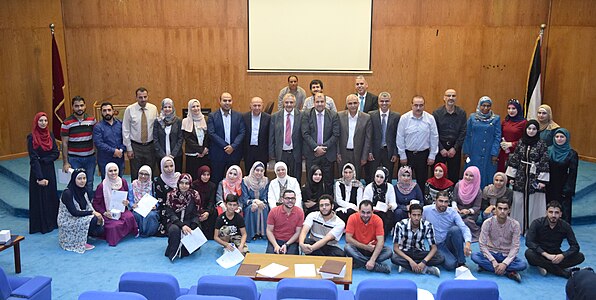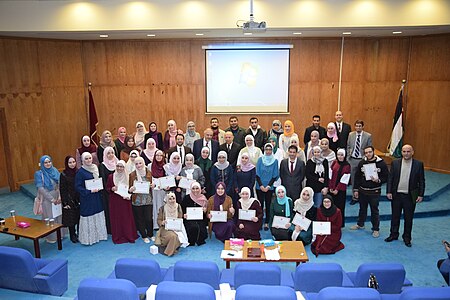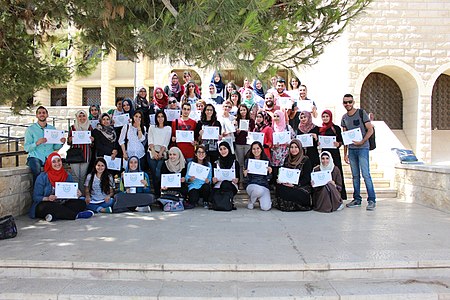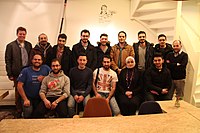Wikimedians of the Levant/Projects
(ويكيميديا بلاد الشام)
Partnerships[edit]

Partnerships, being one of the nine aspects of the 2030 Wikimedia Strategy process, are a high priority within the future vision and work of Wikimedia Levant. One of the main advantages of having a user group (as opposed to an online volunteer community) is the potential of making strong alliances and collaboration with like-minded organizations that may seek similar goals to promoting free & open knowledge. By the end of 2018, Wikimedia Levant had at least half a dozen official or semi-official partnerships set in motion with universities, libraries, non-profits and open source organizations.
GLAM[edit]
Shoman Public Library Wikimedia Levant and the Shoman Foundation (the operator of the largest public library in Jordan) have started working together in late 2018, following the visit of Katherine Maher which was employed as an opportunity to approach the Foundation for a GLAM partnership. So far, a Wikipedia awareness session with a significant attendance has been organized as part of the collaboration. Future work is intended to include hosting Wikipedia edit-a-thons at the Library, doing regular events and engaging children (who already have a high quality educational programs at the Library) in WikiCamps activities.
Project Open Jordanian Heritage[edit]
Within the user group's scope of work, bridging content gaps and expanding topics or visibility related to the Levant region is essential, including its heritage that dates back to some of the earliest stages of human settlement. Hopefully a future role model for the rest of the region, a pilot project was initiated in early 2019 to bring more content about the heritage of Jordan to Wikimedia sites. The project operates with three primary sets of outcomes:
- Heritage data: the first step is to build a coherent database of sites with historical, cultural and national importance in Jordan. After unsuccessfully seeking many government organizations, the American Center of Oriental Research (ACOR) agreed to donate such a database with complete geographical coordinates, site status and other information of about 140 sites. These will be in turn imported to WikiData and used to generate a geolocation map and a Wikipedia article list.
- Heritage photos: except to the notable Petra (among the New Seven Wonders of the world), archaeological sites in Jordan have next to no visual documentation on Wikimedia projects. Volunteers find it hard to take photographs of places often located deep in the desert with limited access, while professional photographs are rarely willing to give up any of their work for free. Luckily, we have been able to agree on initial donations from ACOR and a passionate individual photographers who both have thorough archives of virtually every heritage-related site in the country.
- Heritage articles: eventually, Wikipedia articles remain the most important, well-known and sought after part of Wikimedia work, for which reason, they're crucial for a project aiming to promote Jordanian heritage on Wikimedia sites. After generating a full list of relevant heritage sites from the database we have acquired, a strong campaign will be announced to complete all the necessary articles by the end of 2019 or mid 2020. This will include featured article collaborations by Wikimedia Levant as well as various public edit-a-thons and workshops, the first of which will be held (in partnership with ACOR) starting from September 2019.
Education[edit]
The Education Program includes all the activities and projects which Wikimedia movement organizes in partnership with educational institutions. The idea behind the Wikipedia Education Program is simple: educators and students around the world contribute to Wikipedia and other Wikimedia projects in an academic setting. Wikimedians of the Levant implements (or implemented) the program so far with about a dozen universities and schools in Jordan and Palestine.
The program requires the students to choose a topic, which is not covered yet by the Arabic language Wikipedia, and write a Wikipedia article about it with the help and guidance of the program's team. The program consists of two parts: first, students are taught how to edit Wikipedia, and second, they start applying what they have learned by contributing articles to Wikipedia in their respective disciplines.
Jordan[edit]
Wikimedians of the Levant has major collaborations with Hashemite University in Jordan. The program has produced decent results in a lot of courses over the years.
-
Education Program in Hashemite University on 2016
-
Education Program in Hashemite University on 2017
-
Education Program in Hashemite University on 2018
Palestine[edit]
The Palestinian edition of the program works (or worked) with universities and schools in Jerusalem, Nablus, Birzeit and Hebron. Collaborations include Birzeit University, An-Najah National University, Talae'e Al-Amal Schools, Al-Quds University, Hebron University, Al Hussein Bin Ali Secondary School, Wedad Nasser Al-Din Secondary School and others.
-
Education program in Hebron
-
Education Program in An-Najah National University
-
Education Program in Birzeit University
-
Education Program in Al-Quds University
WikiData[edit]

To keep up the pace with the wider Wikimedia Movement, it's necessary to devote attention and resources to the leading sister WikiProject: that is, WikiData. In this area, Wikimedia Levant focuses on two main aspects:
- Holding local WikiData training that can increase the number of active contributors in Arabic language;
- Contributing content relevant to the user group's scope of work.
For the first purpose, training workshops are organized by the group members in several countries. Examples include a Palestine training in November 2018 and another in Amman in March 2019. As for the content, several partnerships are underway to receive donations of heritage-related databases (and import them to WikiData) from both Jordanian and Palestinian NGOs.
Gender Balance[edit]

Within Wikimedia Levant's vision for organizing Wikimedians who share similar interests, challenges [and] needs, it's extremely important to eliminate gender bias as far as possible in our community. Our user group already has a nearly equal percentage of male to female members, but this balance is yet to be fairly represented in either our online editing community or our content, which still suffers from a severe gender gap. We aspire to bridge this gap and achieve a more balanced community through various events and activities, of which WikiGap is still the most particularly prominent.
WikiGap Amman[edit]
Wikimedia Levant has been partnering with the Swedish Embassy, in addition to various other organizations and groups, to bring WikiGap event to Amman since 2018. WikiGap has been a major success in Jordan and has produced results ranking very high globally, in spite of the relatively small size of the country and its active community. In the event, which takes place for about six consecutive hours during the closest Thursday to the International Women Day (March 8th), participants receive thorough training on how to edit Wikipedia, then each of them are assigned a single article about a Jordanian or Levantine woman to add to Wikipedia. Most of the contributions are made in Arabic, but some are also in English. Common partners in WikiGap Amman include UN Women, Jordanian Open Source Association, Women In Business, Writer's Cell and Al-Khwarizmi Academy (the hosting institution). In 2018, the event has produced a total of 149 articles, which made it one of the most successful versions globally. In 2019, about 130 articles were contributed.
-
WikiGap Amman 2019
Content Gap[edit]

As part of Wikimedia Levant's vision and objectives, bridging content gaps is a particular priority. The four countries of the Levant share a mediocre level of economy and income (ranking within the range of #78 to #118, globally), which, consequently, places them as part of the Global South and of Wikimedia's emerging communities. This does not reflect well on the corresponding content of the region on Wikimedia Projects: for example, English Wikipedia has over 60,000 pages under the label "Switzerland", a country populated by eight million people, but only 6,000 entries under "Jordan", (a country with slightly higher population and a similar land area).
Additionally, Arabic, the native language of the region, suffers from a severe content gap relative to the number of its native speakers. With about 750,000 articles, the Arabic Wikipedia version has a single Wikipedia page per 420 speakers; in comparison, the same ratio in the case of German would be a Wikipedia page per 33 speakers. The gap, however, isn't limited to articles, as Wikimedia Commons also has huge gaps in photo coverage. Quoting the same previous example, of Switzerland and Jordan, the two countries have ## and 3,442 photos listed within their categories in Commons: showing, once more, the huge difference.
To bridge the content gap, both in articles, images and data, Wikimedia Levant dedicates a significant amount of its resources to organizing local contests. These competitions have proven very effective in encouraging Wikimedians to contribute more often in areas rarely approached, otherwise, do to their low appeal. Below are some of the most important activities organized by the group, in two main fields (photography and article editing).
Editing Competitions[edit]
Sumou Competition
Wikimedia Levant managed an online editing competition on Arabic Wikipedia during the period February/March 2017, the prizes of which were a donation by the Sumou Society. The competition was open to all Arabic Wikipedians, and its main theme was "Science". Results included 694 articles newly created, of which 8 articles were nominated as featured content.

Lebanon: Al-Arz Contest
Al-Arz Contest (named after the Cedar tree, a national symbol of Lebanon) was launched in April 2019 as a step to bridge the content gap in topics related to the countries of the Levant. A prize pool of 1,500 USD was allocated to the contest. Its duration is two months, and the format allows participants to contribute to a variety of topics and articles related to Lebanon.
Photography Competitions[edit]
Wiki Loves Monuments[edit]
Wiki Loves Monuments has been organized in the Levant since 2013, that is, just the second year after it became an international competition. At the time, Wikimedia Levant was not officially established yet, so not all countries in the Levant participated together. The contest, though, was repeatedly organized with a continuing, moderate success. At least one country from the Levant has participated in Wiki Loves Monuments in its 2013, 2014, 2017 and 2018 editions. In total, the different version of the contest allocated over 5,000 pictures from Jordan, 2,200 from Syria, +1,000 from Palestine and about 300 from Lebanon. In 2018, a picture from the Levant has won the second place in the international competition, a first of its kind achievement for a country from the Arabic-speaking region.
-
Petra by Night, by Mustafa Wa'ad Al-Qaisy, a photo selected as the 2nd international winner of Wiki Loves Monuments 2019 (the largest photography contest in the world).
Wiki Loves Earth[edit]
Wiki Loves Earth has been occasionally organized in the countries of the Levant starting from 2015. During the first participation, only the contest in Syria brought any results (about 400 photos).
Conferences[edit]
Hosting national and regional conferences is an essential part of the mission that Wikimedia Levant seeks to achieve, as these events are a crucial platform for Wikimedians from around the region to meet together and exchange valuable ideas, experiences and best practices. The user group has organized the second version of WikiArabia, a regional conference of Arabic-speaking Wikimedians, in March 2016. Currently, hosting a future version of the same conference is being discussed.
WikiArabia 2016[edit]
WikiArabia is an annual regional meeting of Arabic-speaking Wikimedians. It typically consists of 2 days dedicated to various presentations, workshops and training sessions, some of which are facilitated by the community, while in others local and regional institutions that work in similar areas are invited to present. The conference was first organized in 2015 by Wikimedia Tunisia. The second version, in the next year, was held in Amman, Jordan from March 24th to March 26th. A team from Wikimedia Levant took on the task of organizing, with Jordanian members doing the on-site work while receiving online support from fellow members in Palestine and Lebanon. The event attracted nearly a hundred participants from 16 countries.
-
WikiArabia 2016 final group photo in the lobby of the Museum of Jordan.
International Collaborations[edit]
Wikimedia Levant seeks to build strong ties and connections with other Wikimedia affiliates around the world. Like all Wikimedia Projects, an affiliate can only work effectively as part of an interconnected, global community. In addition to official collaborations, which are particularly active in the neighboring Arabic-speaking region (but also elsewhere), Wikimedia Levant members also assume active roles in the worldwide Wikimedia Movement, were they participate in representing our region and language community. Our members had previously volunteered as members of the AffCom, Strategy working groups and Wikimania online committees.
Bridges Across Cultures[edit]

Being one of Wikimedia Levant's most successful projects, Bridges across Cultures is an online editing contest that aims to encourage inter-cultural collaboration within the Movement. The basic concept of the contest is to have two regions of the world (i. e. Latin American and MENA) positively compete with each other by means of contributing Wikipedia entries about the opposite geographic region. Wikimedia Levant was a lead organizer on the part of the MENA region, with several other affiliates taking part as well. The contest was initiated in October 2017, and a second edition was held from December 2018 to January 2019. In total, 1,780 articles were added across six different languages through the two versions of the competition. A third edition is also a possibility, though in discussion.
HerStory[edit]
HerStory is a global project and Edit-a-Thon that organized by Wikipedia community, supported by United Nations Women. HerStory campaign held at An-Najah National University in Nablus on October 2017. In total, 16 articles were added with more than 7000 views.
Netherlands[edit]
In collaboration with Wikimedia Nederland, and Stichting Syrische Vrijwilligers Nederland (SYVNL), a group that helps integrate Syrian refugees into Dutch society, Wikimedians of the Levant held a workshop to introduce a group of 14 Syrian refugees to the Arabic Wikipedia on March 10, 2017 in Zwolle.













